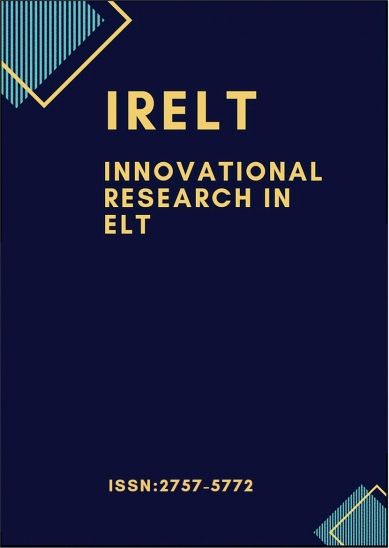Research article | Open Access
Innovational Research in ELT 2024, Vol. 5(1) 20-26
Using ChatGPT in Foreign Language Research: An Overview
pp. 20 - 26 | DOI: https://doi.org/10.29329/irelt.2024.1045.2
Publish Date: June 30, 2024 | Single/Total View: 265/478 | Single/Total Download: 586/511
Abstract
Recent developments in Artificial Intelligence (AI) that are based on the large language model (LLM) may profoundly affect the foreign language research process. Under this perspective, a chatbot, ChatGPT, has become popular in mainstream education and foreign language teaching, learning, and research. On the other hand, whether and how ChatGPT can be used in foreign language research remains a considerable question that is unanswered in the broadest sense. This paper will provide an overview of using ChatGPT in foreign language research. For this purpose, the paper first introduces ChatGPT and then draws its chronological and pedagogical framework. Then, after introducing its features, the paper lists, and discusses the potential role in foreign language research. Finally, it presents basic information regarding its limitations and ethical issues.
Keywords: Artificial intelligence; ChatGPT; research on foreign language
APA 7th edition
Aydin, S. (2024). Using ChatGPT in Foreign Language Research: An Overview. Innovational Research in ELT, 5(1), 20-26. https://doi.org/10.29329/irelt.2024.1045.2
Harvard
Aydin, S. (2024). Using ChatGPT in Foreign Language Research: An Overview. Innovational Research in ELT, 5(1), pp. 20-26.
Chicago 16th edition
Aydin, Selami (2024). "Using ChatGPT in Foreign Language Research: An Overview". Innovational Research in ELT 5 (1):20-26. https://doi.org/10.29329/irelt.2024.1045.2
Arf, C. (1959). Makine düşünebilir mi ve nasıl düşünebilir? [Can machines think, and how can they think?]. Disseminating University Research and Public Education Publications Conference Series, Atatürk University, 91–103.
Cuban, L. (1986). Teachers and machines: The classroom use of technology since 1920. Teachers College Press.
Denkci Akkaş, F., Tekin, I., & Aydın, S. (2022). Does developing research skills increase academic motivation among foreign language learners? The Literacy Trek, 8(2), 142-164. https://doi.org/10.47216/literacytrek.1124192
Dikilitaş, K., & Bostancıoğlu, A. (2019). Inquiry and research skills for language teachers. Springer Nature.
Domingos, P. (2018). The master algorithm: How the quest for the ultimate learning machine will remake our world. Basic Books.
Dowling, M., & Lucey, B. (2023). ChatGPT for (Finance) research: The Bananarama Conjecture. Finance Research Letters, 53, 1-6. https://doi.org/10.1016/j.frl.2023.103662
Gilson, A., Safranek, C., Huang, T., Socrates, V., Chi, L., Taylor, R., & Chartash, D. (2023). How does ChatGPT perform on the United States Medical Licensing Examination? The implications of Large Language Models for medical education and knowledge assessment. JMIR Medical Education. https://doi.org/10.2196/45312
Grant, N., & Metz, C. (2022). A New chatbot is a ‘code red’ for Google’s search business. The New York Times. https://www.nytimes.com/2022/12/21/ technology/ai-chatgpt-google-search.html
Griffee, D. T. (2012). An introduction to second language research methods. TESL-EJ Publications.
Grimaldi, G., & Ehrler, B. (2023). AI et al. : Machines are about to change scientific publishing forever. ACS Energy Letters, 8(1), 878–880. https://doi.org/10.1021/acsenergylett.2c02828
Harnad, S. (2003). Back to the oral tradition through skywriting at the speed of thought. Interdisciplines. https://eprints.soton.ac.uk/257723/1/lyon.html
Jordan, M., & Mitchell, T. (2015). Machine learning: Trends, perspectives, and prospects. Science, 349(6245), 255–260. https://doi.org/10.1126/science.aaa8415
Katwala, A. (2022). ChatGPT’s fluent BS is compelling because everything is fluent BS. WIRED. https://www.wired.com/story/chatgpt-fluent-bs/
Korteling, J., van de Boer-Visschedijk, G., Blankendaal, R., Boonekamp, R., & Eikelboom, A. (2021). Human- versus artificial intelligence. Frontiers in Artificial Intelligence, 4. https://doi.org/10.3389/frai.2021.622364
Kumaravadivelu, B. (2003). Beyond methods: Macrostrategies for language teaching. Yale University Press.
Lin, Z. (2023). Why and how to embrace AI such as ChatGPT in your academic life. PsyArXiv, 1–5. https://doi.org/10.31234/osf.io/sdx3j
McCarthy, J., Minsky, M., Rochester, N., & Shannon, E. (2006). A Proposal for the Dartmouth Summer Research Project on Artificial Intelligence, August 31, 1955. AI Magazine, 27(4), 12-14. https://doi.org/10.1609/aimag.v27i4.1904
McDonough, J., & McDonough, S. (1997). Research methods for English language teachers. Routledge.
Nassaji, H. (2012). The relationship between SLA research and language pedagogy: Teachers’ perspectives. Language Teaching Research, 16(3), 337-365. https://doi.org/10.1177/1362168812436903
Nature. (2023). Tools such as ChatGPT threaten transparent Science; here are our ground rules for their use. Nature, 613(7945), 612–612. https://doi.org/10.1038/d41586-023-00191-1
Negroponte, N. (2006). One laptop per child. TED Conferences. https://www.ted.com/talks/nicholas_negroponte_one_laptop_per_child?language=en
Nunan, D. (1992). Research methods in language learning. Cambridge University Press.
OpenAI. (2023). Explore the OpenAI API. https://platform.openai.com/overview
Postman, N. (1993). Technopoly: The surrender of culture to technology. Vintage Books.
Saenger, P. (1997). Space between words: The origins of silent reading. Stanford University Press.
Sarker, I. (2022). AI-based modeling: Techniques, applications and research issues towards automation, intelligent and smart systems. SN Computer Science, 3(2), 1–20. https://doi.org/10.1007/s42979-022-01043-x
Shen, Y., Heacock, L., Elias, J., Hentel, K., Reig, B., Shih, G., & Moy, L. (2023). ChatGPT and other large language models are double-edged swords. Radiology. https://doi.org/10.1148/radiol.230163
Smith, R. (2013). How technology is changing academic research? WIRED. https://www.wired.com/insights/2013/07/how-technology-is-changing-academic-research/
Thorp, H. (2023). ChatGPT is fun, but not an author. Science, 379(6630), 313-313. https://doi.org/10.1126/science.adg7879
Turing, A. (1950). Computing machinery and intelligence. MIND: A Quarterly Review of Psychology and Philosophy, 59, 433–460.
van Dis, E., Bollen, J., Zuidema, W., van Rooij, R., & Bockting, C. (2023). ChatGPT: Five priorities for research. Nature, 614, 224–226. https://doi.org/10.1038/d41586-023-00288-7
Warschauer, M. (1998). Electronic literacies: Language, culture, and power in online education. Routledge.
